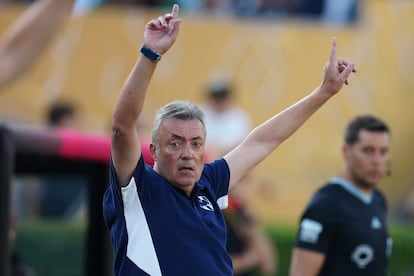Domènec Torrent: "Whoever doesn't defend, I'll substitute in the 15th minute."


After the press conference ahead of Tuesday's round of 16 clash between Monterrey and Borussia Dortmund (3:00, Dazn), Domènec Torrent (62 years old) chatted relaxedly with the Spanish press who had traveled to the Club World Cup. "What we're experiencing is wonderful. We were a team that no one expected and we went through in a group that included Inter Milan and River Plate, as well as Urawa," Torrent said, apologizing in case anyone might be bothered by him speaking to a special correspondent in Catalan. The coach, who was Pep Guardiola's right-hand man at Barça and Bayern Munich, broke away from Guardiola to coach New York City (2019). He is now a freelancer in the coaching market in America, except for a stint with Galatasaray (2022), Flamengo (2020), San Luis (2024-25) and now Monterrey.
Torrent, recruited as a replacement for the dismissed Martín Demichelis, has made his debut in this Club World Cup with Rayados. Two draws, against Inter (1-1) and River Plate (0-0), and a resounding victory against Urawa (4-0), have allowed his team to remain the only representative of the North, Central American and Caribbean Confederation (CONCACAF) remaining in the competition. With little time to prepare for the tournament, Torrent has moved away from the fundamentalism of possession to build a team capable of being flexible in dominating or retreating. "The kids are adapting better than expected due to their quality. Some have competed at the highest level, even the Mexicans and Colombians we have; they have a football education."
Sergio Canales admits Monterrey's style has changed depending on the opponent or the circumstances of the match over the three matches: "The best teams are those that are prepared for any type of match. Against Inter, we knew we had to score, and against Dortmund, it could be similar," predicts the Cantabrian attacking midfielder, who is responsible for Monterrey's offensive play.
In that match against Inter Milan, Rayados took the lead with a Sergio Ramos header off a corner kick saved by Oliver Torres. “We have to do a lot of things well, including managing set pieces, both offensively and defensively. They score a lot of goals like that and are a cut above us,” warns Torrent. He also sends a harsh and direct message to his squad: “We have to compete as a team, defend as a team. Anyone who doesn't defend is taken off in the 15th or 20th minute because it hurts the team. I only know of a couple of players who won games alone. One of them was Messi, and he also had help from his teammates to create the spaces where he performed best.”
Torrent finds it funny when people tell him he's surprised that after Ramos' goal against Inter, his team didn't defend more with the ball than with space. "It's funny when they say 'they dropped back.' No, they drop you back. If they attack with eight players, you can't do it; they send the long full-backs in..."
The Catalan coach is also sensitive to the fact that Dortmund is the weakest European rival left in the competition. "Here, it's like in Spain when it comes to Mexican football: it's not well known. You have to know what Dortmund is like in Germany. This year, they weren't among the best in the Bundesliga, but two years ago, they played in the Champions League final. German teams are always very intense."
Torrent also seems to be clear that European clubs have already completed the adjustment period to the schedules and the competition. "The other day I read some statements from McCallister in which he said that if everyone is normal, the rest of us can't beat the Europeans. The feeling is that European teams are improving as the days go by, but all teams have weaknesses."
Dortmund, under Jürgen Klopp, was one of the pioneers of the paradigm that now sets the pace: high pressing and quick transitions. This World Cup has proven that this model has crossed the pond. “Football is global. Where is there generally less quality? In defense, well, you press there. That's why defenders who can carry the ball well like Cubarsí are increasingly in demand.”

He covers Atlético Madrid and the Spanish national team. He has worked at EL PAÍS since 2012. He previously worked at Dinamic Multimedia (PcFútbol), As, and Público, and for Canal+ as an international football commentator. He also contributes to RAC1 and various international magazines. He holds a degree in Communication Sciences from the European University.
EL PAÍS





